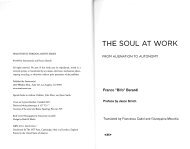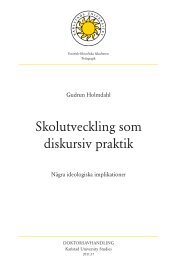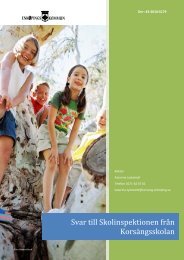FULLTEXT01
FULLTEXT01
FULLTEXT01
You also want an ePaper? Increase the reach of your titles
YUMPU automatically turns print PDFs into web optimized ePapers that Google loves.
An educational research and school development project in the 2000s, of the<br />
kind I participated in myself, can be seen as an example of both „advanced<br />
liberalism‟ and „inclusive liberalism‟, that is to say a kind of control philosophy<br />
with connections to both the EU directives and various policy texts by the<br />
OECD (Dahlstedt, 2009; Walker, 2009). Perhaps it is also possible to apply<br />
Cardinis (2009) expression „post-welfare‟ on this sort of liberal governance<br />
philosophy. One can hardly be mistaken of that the active local citizenship, selfregulating,<br />
committed, responsible and, in a lifelong perspective, learning citizen<br />
is made to an ideal person in the studied practice. That constitutes the image -<br />
not only of the useful and respectable citizen - but also the useful and<br />
respectable school developer.<br />
School development as a discursive practice is partially produced as a synonym<br />
for a real organization of the environment. Today several professionals within<br />
schools - including its largest group of workers, the teachers - are confronted<br />
with texts, in which it is assumed that school development is something both<br />
obvious and correct, which has to take place. It is also quite expected that as a<br />
teacher one should have a positive attitude to all this. One of the things that<br />
have surprised me in the process of this thesis is the discursively seen<br />
widespread acceptance of and the relatively limited questioning of school<br />
development as a discursive practice. The acceptance of the unexpected and, in<br />
several respects ideological implications of this practice, which can be seen as<br />
less admirable is also surprisingly. This seems to fit into an attitude, which<br />
according to Dahlstedt (2009) characterizes an „advanced liberal‟ welfare<br />
regime. Dahlstedt (2009) describes the ideal partnering subject, one that goes in<br />
to ally itself with the problem formulation in e.g. a partnership, that is to say,<br />
one who does not challenge or contest the assumptions or descriptions of<br />
problems or proposals on their solutions. As Dahlstedt (2009) points out, the<br />
ideal partnering subject may turn out to be in conflict with the idea of school as<br />
the place of critical and democratic education. Perhaps it is a conflict that even<br />
school development as discursive practice may prove to contribute. If so, it<br />
would be a somewhat paradoxical ideological implication.<br />
Several texts (e.g. policy texts, scientific papers, media scrutiny) associate<br />
schools to a kind of deficiency, which means that school never really lives up to<br />
the vision or the image of itself. Therefore, school appears to be an enterprise<br />
considered in constant need of intervention and a sort of perpetual revision. In<br />
other words, school development considered as a kind of Sisyphean work.<br />
What is somewhat remarkable is also that the proclaimed revisions do not seem<br />
185






